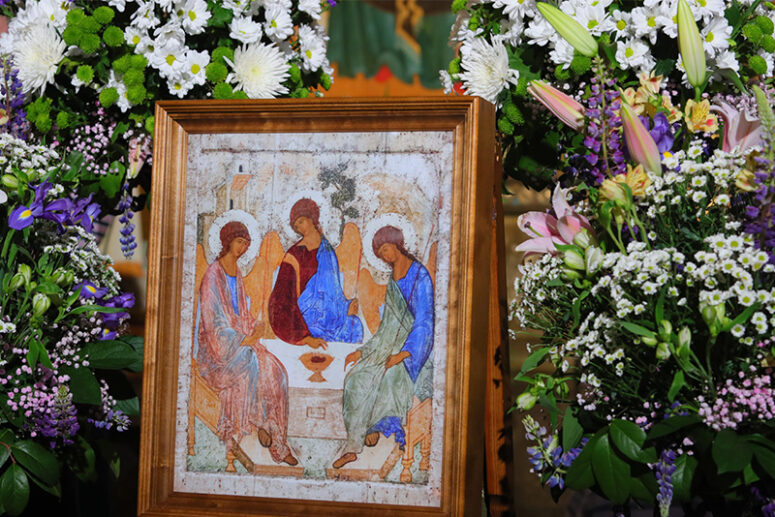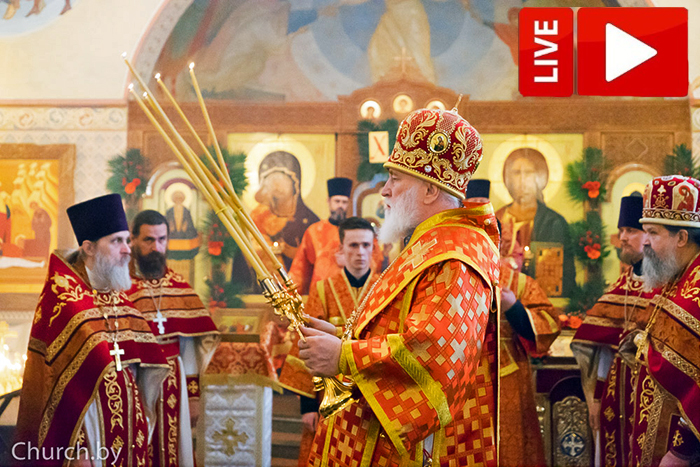
On the day of Pentecost, I would like to say a few words about the significance of the Church. Orthodox Christians are not always able to clearly answer why the Church is needed, therefore, I hope, it should be interesting.
The topic of the Church being merely an ‘earthly’ institution, established with specific and not particularly plausible goals, is increasingly raised In the anti-religious or simply popular secular media. Some Protestant denominations also seem to be pushing this narrative. I think that each of us has faced challenges of this kind, answering questions of our relatives, friends and colleagues, or being set against the popular “I believe in the heart” view point. In trying to fend off sometimes discouragingly ignorant statements, we sometimes get confused. Each of us, of course, feels the importance and necessity of the church, but it is not always possible to represent our feelings in an intelligible verbal form. Pentecost is the birthday of the Church, therefore this topic is extremely relevant.
Let’s begin with setting aside the atheists’ opinion on this matter, because a conversation with them should begin not with the Church, but with the existence of God. In our country, many people call themselves believers, but very few are real members of the Church. Most are convinced that there is nothing to save them from, while others are sure that their salvation is possible only on the basis of their internal and personal relationship with God. The only problem is that neither their actions nor the fruit of this relationship are visible. In view of this, two important questions can be posed:
- If God exists, then how is His grace communicated to a person, directly or indirectly?
- Can faith arise, develop and bear fruit by itself, using the soul’s own efforts, or does it need guidance and help from the outside?
Human salvation does not happen automatically; we all understand that some people will face eternal death. Consequently, there is a certain separating principle. Salvation will be received only by those who join the Savior and become partakers of Divine grace. No one denies that the Lord can have direct influence on a person, but we can say with confidence that such an action is not always obvious and tangible. Only imagine what it would be like if all spiritual life was reduced only to individual experience and had no objective basis. There would be no criteria for determining the correctness of the chosen path or the lived experience. The real perception of grace would appear as correct and necessary as exaltation, hallucinations, attacks of mental disorders and demonic intrigues.
That is why the holy fathers always said that visible means are needed for sanctifying a person. For example, St John Chrysostom points out that because a man consists of two natures, spiritual gifts are given to him in sensual images. St Paul the Apostle has remarkable thoughts that can be quoted in response to the “faith in the soul” argument. They are expressed in the form of rhetorical questions, “For ‘Everyone who calls on the name of the Lord will be saved.’ How, then, can they call on the one they have not believed in? And how can they believe in the one of whom they have not heard? And how can they hear without someone preaching to them?” (Rom. 10, 13-14). From this quote, we can conclude that in order to commune with Divine grace, a person needs both visible actions and visible guidance.
Think about the fact that Christ, during His earthly ministry, does not simply preach to everyone who hears Him, but also chooses a group of apostles His close disciples, the apostles. In the Gospel reading at the liturgy on the day of Pentecost, we hear the following words of the Savior: “Receive the Holy Spirit. If you forgive the sins of any, they are forgiven them; if you retain the sins of any, they are retained” (John 20: 22-23). This is an indication of the exceptional nature of the apostles. Later, the Holy Spirit in the form of tongues of fire descends only on them, and not on all listeners and followers of Christ. Any reinterpretation of the corresponding passage in the Holy Scriptures (Acts 2: 1-11) is arbitrary and has no real basis.
After His Resurrection, Christ has been appearing to the disciples for forty days, instructing them and preparing them to receive the Holy Spirit. On the day of Pentecost, it was the apostles who were the first to be counted worthy of this. They became mediators bringing Divine grace down on others. For a period of time, only the apostles were authorized to hand the Spirit over by the laying on of hands. Note that Philip, one of the seven deacons, baptized the Samaritans, but could not lay his hands on them. For this, the apostles Peter and John were sent to him from Jerusalem. Remember also the story of Simon the sorcerer, who offered the disciples of Christ money for the opportunity to receive the gifts of the Holy Spirit. He was baptized, but his ‘personal’ Pentecost never happened. All this means that “faith in the soul” is not enough.
As we can see, the Lord Himself established a certain order of consecration, where the apostles became the first mediators, leaders and teachers in this great action. Can anyone doubt that the Savior wants to maintain the order that He established Himself?!
We all understand perfectly well that “faith in the soul”, or faith without church is just an excuse for our own inactivity and laziness. Those who adhere to this point of view also understand this, but they do not want to admit this, because doing so would result in the need to take action and change their lives. I hope that this text gives us a couple of new arguments that, perhaps, will help someone to embark on the path of salvation, which is impossible without the Church. Finally, let us recall the famous words of St Cyprian of Carthage, “He to whom the church is not a mother, cannot address the Lord as ‘Father'”.
Translated by The Catalogue of Good Deeds
Archpriest Vladimir Dolgikh
Source: https://pravlife.org/ru/content/pyatidesyatnica-zachem-nuzhna-cerkov-i-mozhno-li-verit-v-dushe




